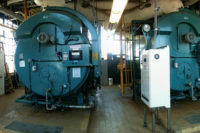Dramatically higher fuel costs over the past year have affected almost every industry, leading some to take a closer look at technology that is more fuel efficient and, therefore, less costly.
With fuel costs remaining at lofty levels and the instability and uncertainty caused by numerous policy changes and situations throughout the planet, industrial steam boiler users are taking a harder look at the advantages of modular systems.
Those utilizing modular steam boilers boast of reduced emissions, less water use, the conservation of natural resources, and energy savings. These benefits have been noted by facility directors and engineers in several industries, prompting other processing businesses, health care organizations, and educational facilities that rely on steam to investigate modular boiler technologies.
Modular steam boilers are recognized for their compact size. Additional benefits include easy installation, operation, and maintenance, which are notable in an era of runaway inflation and cost spikes.
With burgeoning fossil fuel costs making everything more expensive, Miura has decided to lift the hood on modular boiler systems to see what makes them tick.
Modular boilers consist of a series of smaller boilers working in tandem with one another that are then operated as a single boiler system by one master controller to provide varying amounts of steam as needed.
Modular boilers were conceived not only to confront the physical space issue (or new construction costs) but also to add value to boilers that can now operate at peak efficiency and thereby reduce fuel costs and emissions.
As the steam requirements of facilities rise and fall rapidly, modular boiler systems quickly turn boilers on and off to eliminate wasteful energy and water consumption. These systems also reduce harmful emissions because boilers are not running unnecessarily. And, since each boiler has a burner that works independently of the other boilers, modular boilers can operate with oil, gas, or propane interchangeably.

Key fuel-saving advantages include quick startup, in-service efficiency, intuitive engineering, N+1 benefits, and more.
Quick Startup
Modular steam boilers can achieve full steam from a cold start in less than five minutes, while others can take several hours to produce steam. Obviously, there will be a substantial difference in fuel costs between the two.
Faster startup means modular units automatically turn off quickly and completely as needed and still meet peak-load requirements, an enormous advantage that reduces usage.
“The four [modular] boilers provided us with an economical way to maximize our usage of the boilers,” said Joe Buri, director of facility services at Southeastern Health. “And being quick steamers allowed us to completely shut off boilers that were not needed but could be ready and online in minutes. We have had good success with these units and have reduced our fuel usage by 20% while adding additional load at the same time. The boiler in the laundry area is used exclusively for that purpose. It shuts down nights and weekends, saving almost 40% when compared to the previous year.”
In-Service Efficiency
Some modular steam boilers, including those from Miura, rely on watertube designs to provide optimal heat transfer and offer fuel-to-steam efficiencies of around 87%, which translates into major fuel savings.
Essentially, efficiency is measured by the output of steam versus the fuel used. In high-load demand situations, modular watertubes and conventional firetube boilers maintain their efficiency levels at the peak level indicated.
In lower load situations, modular watertube boilers continue at the same high efficiency rating. When load demand falls off significantly, modular watertube boilers automatically shut off completely for absolute efficiency, since there is no output nor fuel used.
Going a step beyond fuel-to-steam efficiency, modular boilers maintain the same efficiency in high and low fire, giving them high in-service efficiency. That means no matter what level of operation the units produce steam at, the efficiency will remain at the same high percentage level for consistent fuel savings.
“The old-school train of thought was that if a facility’s peak load in the winter time requires a 600 boiler horsepower, then the facility would require a single boiler that can meet that demand, even if the demand is only required for a few weeks or months out of a year,” said Brandon Hargett, sales rep., Boiler Masters Inc. in Greensboro, North Carolina. “However, most facilities don’t require maximum capacity on a year-round basis. They have a large unit that runs at a decreased firing rate, which is less efficient than what that unit is designed to run at the higher levels of output.”
Intuitive Engineering
Modular steam boilers offer several intelligent or intuitive engineering advances that help to reduce fuel consumption and emissions.
Rapid steam generation from a cold start improves steam generation operations by matching the actual load demand with boiler output in real time, essentially. This is known as load-following technology. When a project only requires 25% or 50% output, the system only brings on the units needed to carry that load. That’s a tremendous cost- and resource-saving advantage in the long run.
Modular steam boiler configurations also make it easier to provide scalability that adjusts steam output to specific requirements.
Plus, modular design gives users the flexibility to grow with their business requirements, increasing the overall steam supply simply by adding a unit or turning units off or on, thus taking advantage of optimal performance.
N+1 Redundancy Benefits
In applications that require redundant systems, modular watertube boilers better fit space and cost requirements. During low production, unnecessary units can be turned off and quickly restarted when the need returns.
The built-in redundancy, with multiple modular units working as one, allows steam generation to continue while a unit receives maintenance.
Green Initiatives
Modular steam boilers offer a range of green advantages, including low NOx and high energy efficeincy, which are additional reasons facility managers are making the switch.
“Green initiatives are an important part of our company’s mission statement,” said Hargett. “With Miura’s quick-steam feature, we can idle the boilers during lower demand periods and turn them on as needed. That, alone, is an enormous advantage. Plus, it allows us to use less fuel, have fewer emissions, use less water, and conserve natural resources.”
Summary
In today’s economy, wasteful spending is being put under a microscope as more companies and facilities rely on proven innovative technologies to help carry the load. In the industrial steam business, the word “modular” is appearing more and more frequently.




